The Complete Musician Student Workbook, Volume II: An Integrated Approach to Tonal Theory, Analysis, and Listening
Select Format
Select Condition 
Book Overview
This student workbook accompanies The Complete Musician: An Integrated Approach to Tonal Theory, Analysis, and Listening . The second of two volumes, it provides exercises that accompany chapters 20-34 of the text.
Format:Paperback
Language:English
ISBN:0195160606
ISBN13:9780195160604
Release Date:May 2003
Publisher:Oxford University Press, USA
Length:304 Pages
Weight:2.20 lbs.
Dimensions:0.6" x 8.3" x 11.2"
Customer Reviews
4 ratings
Very Detailed text
Published by Thriftbooks.com User , 15 years ago
I used this in college along with a few others. I have studied Harmony from Shoenburg, Piston, Adwell, Laitz, and another Programmed Course whose name I forgot. This text is by far the most detailed and progressively topical. The amount of examples are ok. The best thing is that they present the subjects all hanging from the frame work of the phrase model. It is INDISPENSABLE to learn harmony in this way. Unless you are writing or studying special polyphonic forms like fugues of newer modern forms this is the only serious way to understand music. Most of baroque, classical, and romantic, post-romantic, and jazz are based on the phrase model. I recommend reading Piston's Harmony too which is the opposite treatment to harmony. Piston is wordy and loose, his examples more free and although he mentions the phrase model it is by no means so systematically elucidated. I do not recommend Piston to create a "working" knowledge of harmony. Observe these two authors treatment of the Sequence to get a good idea of what I'm talking about. The only thing wrong with this series is that the workbooks are simply ok and more specifically the DVD's that accompany the workbooks and text are so poorly organized that it is impossible to use them correctly.
simply put, this is the best!!!!
Published by Thriftbooks.com User , 15 years ago
I am a self-taught and studied off Schoenberg's 'Treatise of Harmony' and MacPherson's 'Melody and Harmony'. The former is an unique and philosophical study in harmony, the latter a more common harmony textbook,but nevertheless very succint and well organized. But 'The Complete Musician' is really the best of modern books about harmony and more. You can't argue with about 850 pages packed full of great music instruction,from harmony,to the motive,to forms. You can't argue with a book that comes with two dvd's of recorded examples by an orchestra. This is simply the best book about music I have ever seen. I also own 'Tonal Harmony' by Kostka and 'Music in theory and practice' by bruce Benward. They are all really good,they all come with recorded examples (an amazing aid) but for me The Complete Musician is really hard to beat, it is the most complete of all,and the most detailed. For example,if you examine the lessons about Sequences in the two books mentioned (tonal harmony, Music in theory and practice) you'll see that The Complete Musician has the most detailed explanations. All the topics are treated in this fashion. This is really the book I have always wanted. I wish they had written it 10 years ago. Buy it with no hesitation, it's unbeatable value.
Excellent textbook...
Published by Thriftbooks.com User , 18 years ago
...comprehensive, detailed but nevertheless succinct and to the point...the writing is a bit dry but after all it is a textbook.
An excellent linear approach to common-practice harmony
Published by Thriftbooks.com User , 19 years ago
This book is best for those who have already taken a full course in tonal harmony and understand it well from a functional perspective but want to understand it better from a linear perspective. It is a very complete course in common practice tonal harmony. It is in many ways an updated successor to Aldwell & Schachter in that it pays attention to every minute detail of voice leading and part-writing. Varieties of V-I take over 100 pages alone. For those interesting in mastering the common practice writing style, this is much better than, for example Benward or Piston, which focus more on the functional aspects of harmony, but neglect the linear. If you have this, W. A. Mathieu's Harmonic Experience, Bert Ligon's Jazz Theory text, and Ludmila Udmela's text on contemporary harmony you have 90% of what you need to know about tonal harmony. Who is this book not for? It is not for those interested in learning harmony in Jazz, Pop, or 20th century styles. Also, the title "Complete Musician" is a misonomer. It is only common-practice harmony. This book requires a solid foundation of the basics of music theory to absorb--I can imagine it being very confusing if used for unprepared college freshmen, because it doesn't spend much time on fundamentals.





